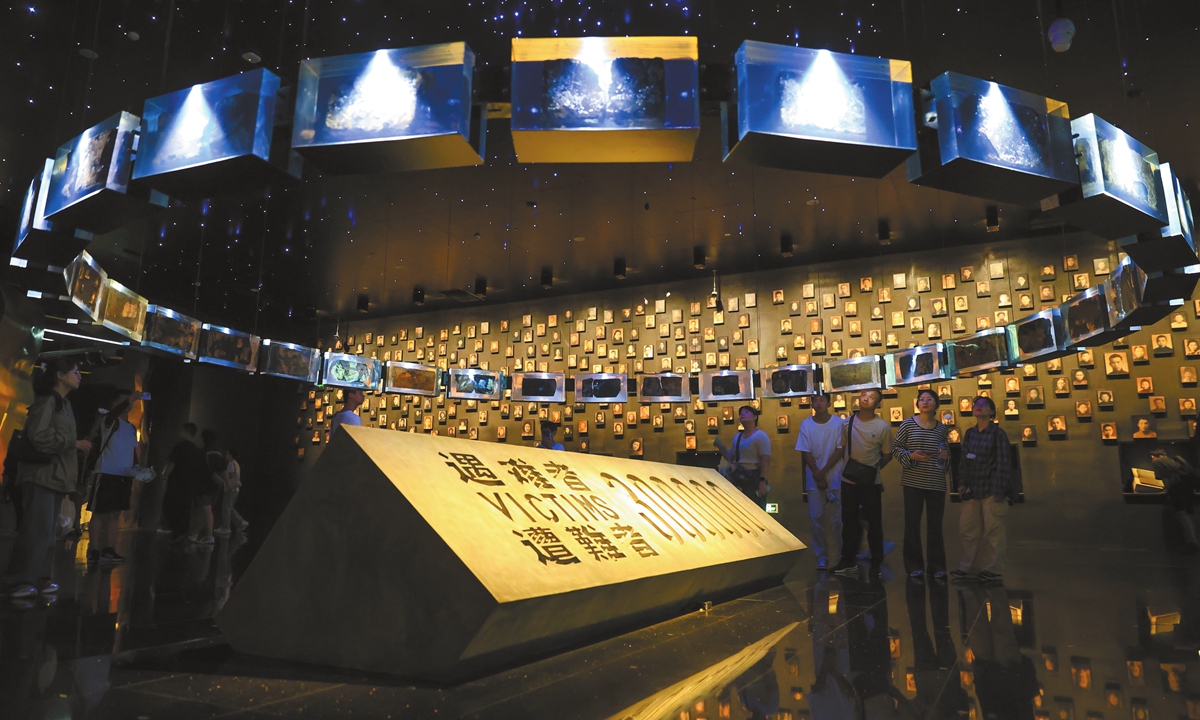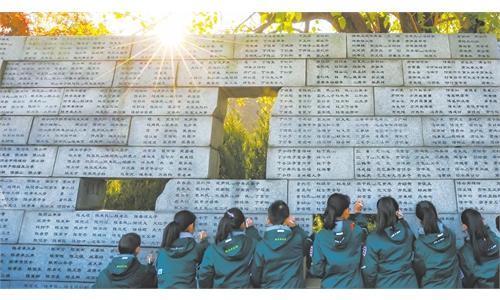
People visit the Memorial Hall of the Victims in Nanjing Massacre by Japanese Invaders in Nanjing, East China's Jiangsu Province, on September 18, 2024. Photo: VCG
Editor's Note:
2025 marks the 80th anniversary of the victory in the Chinese People's War of Resistance against Japanese Aggression and the World Anti-Fascist War. Eight decades have passed, yet the world once again finds itself at a crossroads. The rise of unilateralism, ongoing geopolitical turbulence and the distortion of historical truths remind us of the enduring relevance of remembering the past and safeguarding peace. Against this backdrop, the Global Times launches the column "Revisiting WWII, Defending Peace," inviting renowned scholars and peace advocates from around the world to revisit the history of World War II (WWII) through contemporary lenses. Through diverse perspectives, the series seeks to uphold historical memory, promote shared development, and defend fairness and justice. Only by confronting history with honesty and clarity can humanity find the wisdom to shape a more peaceful and sustainable future. This is the second article of this series.
The Chinese People's War of Resistance Against Japanese Aggression fired the first shot in the World Anti-Fascist War, opening the main theater in the East of the World Anti-Fascist War. Through 14 years of unyielding and heroic resistance, the brave Chinese people ultimately defeated the Japanese militarist aggressors and secured a great victory. This historic triumph not only safeguarded the nation from peril and achieved national independence and liberation, but also made an indelible contribution to the final victory of the World Anti-Fascist War, to world peace, and to the progress of human civilization.
China was one of the first to confront fascist aggression in WWII - it was the first to start, endured the longest and made tremendous sacrifices. On September 18, 1931, Japanese troops blew up a section of railway under their control near Shenyang and accused Chinese troops of sabotage as a pretext for the attack. Later that night, they bombarded barracks near Shenyang. The September 18 Incident marked the start of Japan's 14-year invasion of China.
While the major Western powers adopted a policy of appeasement toward Japan's aggression, it was semi-colonial, semi-feudal China that stood up first and raised the banner of resistance against fascist invasion. As former US president Franklin D. Roosevelt once said, "The Chinese people were the first to stand up and fight against the aggressors in this war."
In the face of a powerful and brutal enemy, the Chinese people stood united with unwavering resolve. With a spirit of shared purpose and sacrifice, they adopted a strategy of protracted warfare. This forged an extraordinary chapter in the history of warfare and a monumental feat of the Chinese nation.
China's resistance ultimately crushed Japan's militarist ambitions to colonize and enslave China, and it marked the first complete victory in modern Chinese history against foreign aggression. On September 2, 1945, representatives from the Japanese government signed the Japanese Instrument of Surrender, signaling the final victory of both the Chinese People's War of Resistance Against Japanese Aggression and the World Anti-Fascist War.
The Chinese People's War of Resistance Against Japanese Aggression served as the main Eastern theater of the global war against fascism, making an indelible and immense historical contribution to the final victory of the World Anti-Fascist War. Throughout the global struggle, China shattered Japan's illusion of a "quick victory." China's resistance provided crucial time for the Soviet Union, the US, the UK and other Allied powers to prepare for war. The Chinese theater also actively supported Allied operations in Europe and the Pacific.
The Chinese People's War of Resistance Against Japanese Aggression stood at the center of the anti-fascist struggle in the East, serving as both a symbol and a driving force. It actively supported anti-Japanese resistance and national liberation movements across other Asian countries. On June 22, 1941, Nazi Germany invaded the Soviet Union. The very next day, chairman Mao Zedong drafted a resolution for the Central Committee of the Communist Party of China titled "On The International United Front Against Fascism." The resolution stated: "For Communists throughout the world the task now is to mobilize the people of all countries and organize an international united front to fight fascism and defend the Soviet Union, defend China, and defend the freedom and independence of all nations."
The Chinese People's War of Resistance Against Japanese Aggression earned the respect of people around the world and laid the foundation for China's status as a responsible major power on the global stage. During the global fight against fascism, China was among the first to call for the establishment of a united international anti-fascist front and the safeguarding of lasting peace in the postwar world. It played a proactive and driving role in building the international anti-fascist alliance.
In January 1942, China, along with the US, the UK and the Soviet Union, with 26 countries in signing the Declaration by United Nations, marking the formal establishment of the international anti-fascist united front. This shifted the global balance of power and created favorable conditions for hastening the victory over fascism. China also played an irreplaceable and distinctive role in shaping the postwar peace and security architecture. During the founding of the United Nations and the drafting of the UN Charter, China - representing less powerful nations - actively advocated for justice, national liberation and sovereign equality. Many of its proposals were incorporated into the Charter. On October 24, 1945, the United Nations was officially established, with China becoming one of the five permanent members of the UN Security Council - an essential force in safeguarding world peace.
This year marks the 80th anniversary of the victory in the Chinese People's War of Resistance Against Japanese Aggression and the World Anti-Fascist War. Though the smoke of war has long dissipated, the roots of conflict have not been eradicated. Hegemonism, cold war mentality and power politics still persist. The specter of militarism lingers, while armed conflicts and local wars continue to erupt in the postwar world. Humanity is now facing profound changes unseen in a century.
To resolutely defend the hard-won victory of the World Anti-Fascist War, to thoroughly eliminate the roots of war, and to ensure that the victory of the anti-fascist struggle is never denied, the postwar international order is never challenged, militarism and fascism never revive, and historical tragedies are never repeated is a sacred duty shared by all nations and peoples, and the most meaningful way to honor the victory achieved in that global struggle.
China, a socialist country committed to peace, firmly upholds an independent foreign policy of peace and remains committed to the path of peaceful development. It advocates for the building of a community with a shared future for mankind and contributes to safeguarding world peace and advancing the cause of human progress. China has always pursued a defensive national defense policy and the principle of active defense. It opposes aggression and expansion, and is committed to building a strong national defense and a powerful military commensurate with its international standing, aligned with its security and development interests.
Under the leadership of the Communist Party of China, the Chinese People's Liberation Army is striving to build a world-class military at a fast pace, in order to achieve the goal of strengthening the nation's armed forces. It serves as a robust strategic pillar for safeguarding China's national sovereignty, unity and territorial integrity, protecting China's overseas interests, and promoting global peace and development.
The author is a PLA Lieutenant General and former vice president of the Academy of Military Sciences of the PLA. opinion@globaltimes.com.cn

